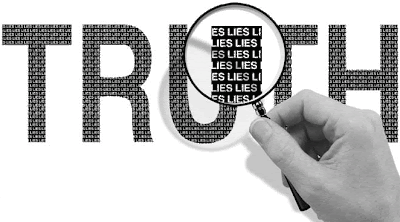A deliberate statement, known by the
speaker of it to not be the whole truth; is reasonably inexcusable. A lie may
justify good in certain situations; however the nobleness and politeness of the
lie still doesn't transform it into truth. The philosophy of lying has been
well researched, varying views, diverse opinions and assorted arguments, all of
which have dissected lies into justifiable versus unpardonable breaches of
faith and trust; something that today’s sphere needs to thrive and survive.
The barefaced lie is obvious to the
listener, bluffing is an exaggeration of self-ability, economizing with the truth entails hiding
facts, fibbing is false information but usually excludes malicious intentions, a
jocose lie simulates teasing, perjury comprises lying under oath, while puffery
includes lies of claims made by advertising companies. At the same time the
noble lie is potentially beneficial to people, emergency lies are stated to withhold
information that may cause instantaneous trouble and lies to children seem
justifiable to make them believe in the goodness of fairies, angels and Santa Claus.
Lies exist in abundance!
Why do people lie?
The answer is quite simple: Because it
takes too much courage to speak the truth. The truth is often bitter,
embarrassing, awkward and humiliating.
Souls that have not risen to a superior level of self-acceptance,
usually stoop to low levels of deceit. The omission of truth seems to typically
avoid negative consequences in the short run; it however tarnishes character
and blemishes the soul in incorrigible ways. Lies become part of the persona
and it becomes impossible to stop the fraudulent pattern of existence. Who’s
smarter, stronger and superior?
- Hacker vs. Programmer?
- Terrorist vs. the CIA?
- Aleck vs. Dutiful worker?
- Liar vs. Truthful person?
Traits of the liar
As such lying takes longer than telling the
truth; it requires greater cognitive effort, better planning and organization
skills; and undeniably a loftier memory. The liar needs to make sure that the
lie stays secret; that the lie is consistent among all those who may interact
with factual information, as well as safeguard ones charisma. Everyone has the liberty
as well as opportunities to lie, few have the aptitude to do it right. Liars
ought to beware of the ‘Truth Wizards’.
Truth Wizards
Lying is an art; the lesser able group of
people who choose to mask the truth usually get discerned by the ‘Truth
Wizards’. Truth wizards are adept at pinpointing lies. They have a knack to
spot deception with great accuracy. They ascertain the cues through the nature
of information offered, body language, fumbling, inconsistencies in
responsiveness as well as facial expressions. Though it seems like an art; it needn't necessitate professional training, however it does mandate emotive awareness of
truthfulness. If you know the sound of honesty, it’s easy to differentiate it
from a lie. At the same time, habitual liars may ascertain lies effortlessly as
they are excessively emotive (in the wrong direction) and have mastered forgery
adequately to see it occur.
Catch the lie
The time to answer a question may be used
as a method of lie detection. However, instant answers can be proof of an organized
lie. The only compromise is to try to surprise the victim and find a midway
answer, neither too quick, nor too long. Children’s lies are easily caught
while adults usually season their mendacious abilities and breach the trust of
friends, family, bosses, employees as well as partners. Leading questions
frequently help seize treachery (lawyers us these often.)
Why lie...
The capacity to lie is a developmental phenomenon. Children lie owing to lack of moral focus. If morality is not learned, they grow into lying adults. Conscience is not created in adulthood; its roots are sown in childhood itself. By four and a half years, children can lie convincingly if they identify the knack to do so. Lies offer bad taste, they damage relationships and break trust. We all truly deserve a good nights sleep after a hardworking day. An honest predisposition allows for peace and contentment with oneself; that is the most supreme form of accomplishment...


No comments:
Post a Comment